Falkland or Malvina? The Anglo-Argentine War began thirty-three years ago.
Contested territory
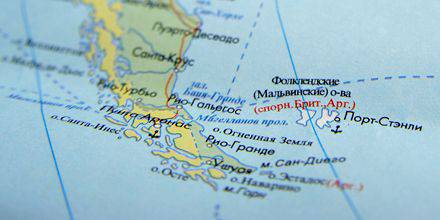 All story The Falkland Islands in the New and Newest Time is the story of a big dispute between the British and the Spaniards (later changed by the Argentines) about who really has the priority right to own the strategically important islands. The British believe that the islands were discovered in 1591-1592. British navigator John Davis, who served as captain of the ship in the expedition of the famous British explorer and corsair Thomas Cavendish. However, the Spaniards claim that the island was discovered by Spanish navigators. Before colonization by Europeans, the Falklands were uninhabited. In 1764, the French navigator Louis Antoine de Bougainville arrived on the island, creating the first settlement on the island of East Falkland - Port-Saint-Louis. However, in January 1765, the British navigator John Byron, who landed on Saunders Island, declared it the territory of the British crown. In 1766, a British settlement was founded there. However, Spain, which had acquired a French settlement on the Falklands from Bougainville, was not going to put up with the presence of the British on the islands.
All story The Falkland Islands in the New and Newest Time is the story of a big dispute between the British and the Spaniards (later changed by the Argentines) about who really has the priority right to own the strategically important islands. The British believe that the islands were discovered in 1591-1592. British navigator John Davis, who served as captain of the ship in the expedition of the famous British explorer and corsair Thomas Cavendish. However, the Spaniards claim that the island was discovered by Spanish navigators. Before colonization by Europeans, the Falklands were uninhabited. In 1764, the French navigator Louis Antoine de Bougainville arrived on the island, creating the first settlement on the island of East Falkland - Port-Saint-Louis. However, in January 1765, the British navigator John Byron, who landed on Saunders Island, declared it the territory of the British crown. In 1766, a British settlement was founded there. However, Spain, which had acquired a French settlement on the Falklands from Bougainville, was not going to put up with the presence of the British on the islands. It should be noted here that the dispute between the Spaniards (Argentines) and the British on the question of the ownership of the islands is also reflected in the toponymic plane. The British call the Falkland Islands - after the Falkland Passage between the two main islands. Back in 1690, this strait was named after the Falklands viscount Anthony Carey. The Spaniards, and later the Argentines, use the Malvinas name to designate the islands, raising it to the French name given to the islands by Captain Bougainville in honor of the first colonists - the Breton seamen from the French port of Saint-Malo.
In 1767 on the Malvinas Islands, a Spanish governor was appointed, and in 1770, Spanish troops attacked a British settlement and drove the British from the island. However, according to the agreement between Spain and the UK, the British had already regained a settlement in Port Egmont in 1771. Thus, at the end of the XVIII century, Great Britain and Spain continued to claim ownership of the islands. But the British in 1776 were evacuated from the Falklands, since London before the American War of Independence left many overseas colonies, gathering strength. The Spaniards, unlike the British, retained a settlement in the Malvinas Islands until 1811. The Spanish settlement was part of the Vice-kingdom of Rio de la Plata.
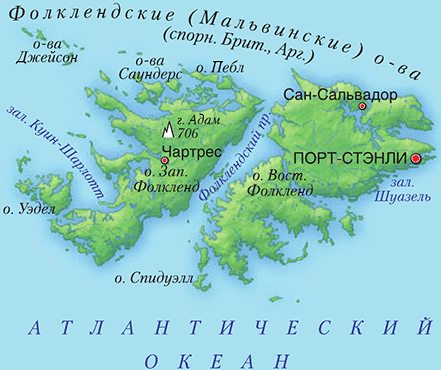 In 1816, as a result of decolonization, the vice-kingdom of Rio de la Plata declared independence and became sovereign Argentina. The Malvinas Islands were declared part of the territory of Argentina. However, in fact, the young Argentine authorities poorly controlled the situation in the Falklands. In 1828, an entrepreneur named Louis Vernet founded a settlement on the island. The islands were of great commercial interest for him, so he received permission from the Argentine government to establish a settlement here. Meanwhile, seals and American whalers were fishing in the coastal waters of the Falkland Islands. Verne did not like this very much. He considered himself the sovereign owner of the islands and claimed monopoly production of seals in the territorial waters of the Falkland Islands. The Vernet people seized several American ships, which provoked a response from the United States. The American warship arrived at the Falkland Islands and arrested several inhabitants of the Werne settlement. The latter also left the island. In 1832, the Argentine authorities attempted to regain control of the islands and sent the governor there, but he was killed. 2 January 1833 of the British claimed their claim to the Falklands, whose squad landed on the islands. But only 10 in January 1834 over the islands was officially raised the flag of Great Britain and appointed a "resident naval officer", whose powers included the management of the Falklands. In 1842, the position of governor of the Falkland Islands was introduced. Argentina, of course, did not recognize the seizure of the Falkland Islands by the British and continued to consider them its territory and call them the Malvinas Islands. For nearly two centuries, Argentines are very worried about the presence of the British on the islands. However, they live on the Falklands, mostly descendants of British, Scottish and Irish immigrants. Therefore, the sympathies of the local population are rather on the side of Great Britain, and London is successfully taking advantage of this, justifying its right to ownership of the islands.
In 1816, as a result of decolonization, the vice-kingdom of Rio de la Plata declared independence and became sovereign Argentina. The Malvinas Islands were declared part of the territory of Argentina. However, in fact, the young Argentine authorities poorly controlled the situation in the Falklands. In 1828, an entrepreneur named Louis Vernet founded a settlement on the island. The islands were of great commercial interest for him, so he received permission from the Argentine government to establish a settlement here. Meanwhile, seals and American whalers were fishing in the coastal waters of the Falkland Islands. Verne did not like this very much. He considered himself the sovereign owner of the islands and claimed monopoly production of seals in the territorial waters of the Falkland Islands. The Vernet people seized several American ships, which provoked a response from the United States. The American warship arrived at the Falkland Islands and arrested several inhabitants of the Werne settlement. The latter also left the island. In 1832, the Argentine authorities attempted to regain control of the islands and sent the governor there, but he was killed. 2 January 1833 of the British claimed their claim to the Falklands, whose squad landed on the islands. But only 10 in January 1834 over the islands was officially raised the flag of Great Britain and appointed a "resident naval officer", whose powers included the management of the Falklands. In 1842, the position of governor of the Falkland Islands was introduced. Argentina, of course, did not recognize the seizure of the Falkland Islands by the British and continued to consider them its territory and call them the Malvinas Islands. For nearly two centuries, Argentines are very worried about the presence of the British on the islands. However, they live on the Falklands, mostly descendants of British, Scottish and Irish immigrants. Therefore, the sympathies of the local population are rather on the side of Great Britain, and London is successfully taking advantage of this, justifying its right to ownership of the islands. From Operation Antonio Rivero to Operation Rosario
Disputes between Britain and Argentina over the ownership of the islands have been going on for almost two hundred years. But until the second half of the twentieth century, they were diplomatic in nature and did not lead to open opposition to the world's largest colonial power and one of the largest Latin American states. However, in the 1960, there was an attempt of an armed invasion of Argentines into the territory of the Falkland Islands, however, it was not made by government forces, but by members of the Argentine nationalist organization Takuara. The patriots of Argentina planned to land on the Falklands and proclaim the creation of a National Revolutionary Argentine state on the islands. The operation, planned by the nationalists, was named “Antonio Rivero” - after the legendary Argentine revolutionary, back in the 1833 year, immediately after the seizure of the islands by the British, who had revolted there against the colonialists. The first attempt of the "revolutionary landing" on the islands was the action of Miguel Fitzgerald. This Argentine patriot of Irish origin 8 September 1964 flew to the islands in a private jet, hoisted the Argentine flag and handed an ultimatum to the local official, ordering to return the Malvinas Islands to Argentina immediately. Naturally, there was no response from the British authorities to the Fitzgerald act. In 1966, a group of activists from the New Argentina movement, led by Dardo Cabo, hijacked an airline of Argentine Airlines and landed at the airport in the island’s capital city of Stanley. About thirty people who were in the group of Argentine nationalists, announced the return of the islands of Argentina. However, the attempt of decolonization was unsuccessful - the Argentines were deported from the territory of the Falkland Islands by a detachment of British royal marines.
Nevertheless, unsuccessful attempts to claim rights to the Falklands did not cool the ardor of the Argentines, who wanted to once and for all put an end to the traces of the British colonial presence off the coast of their country. In the same 1966, the campaign of the Argentinean submarine Santiago del Estero was organized to the shores of the Falkland Islands. Formally, the submarine followed to the Argentinean naval base fleet Mar del Plata, however, in reality, it was facing completely different tasks. 40 kilometers south of Port Stanley, six Argentinean special forces from the Buzo Tactico unit (Argentinean Navy Tactical Divers Group) landed from a submarine. In two groups of three fighters, Argentinean commandos reconnoitered the area in order to determine the optimal locations for a possible amphibious landing. Thus, the Argentine military command did not give up the likely power scenario of the reunification of the Falkland Islands with Argentina, although the country's leadership tried to solve this problem through diplomatic means. Argentine authorities throughout the 1970s. negotiated the status of the islands with Great Britain, which at the end of the decade had finally reached an impasse. Moreover, in 1979, the government of Margaret Thatcher was established in London, which negatively related to the decolonization of British possessions. However, in Argentina itself there were political changes that contributed to the aggravation of Anglo-Argentine contradictions.
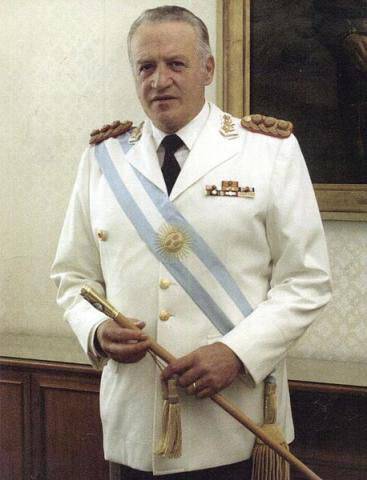 22 December 1981. As a result of a military coup, Lieutenant General Leopoldo Galtieri came to power in Argentina. Pyatidesyatipyatiletny Leopoldo Fortunato Castelli Leopoldo Galtieri (1926-2003), a descendant of Italian immigrants, made in the Argentine army major career began service as a cadet in the military academy at the age of 17-1975 and was promoted to commander of the Engineering Corps of Argentina. In 1980, he became commander-in-chief of the Argentine army, and a year later seized power in the country. General Galtieri expected that with the return of the Falkland Islands to Argentina, he would gain popularity among the country's population and go down in history. Moreover, after coming to power, Galtieri made a visit to the United States and was well received by Ronald Reagan. This convinced the general of the support from the United States, which, in his opinion, untied his hands to start the operation on the Falklands.
22 December 1981. As a result of a military coup, Lieutenant General Leopoldo Galtieri came to power in Argentina. Pyatidesyatipyatiletny Leopoldo Fortunato Castelli Leopoldo Galtieri (1926-2003), a descendant of Italian immigrants, made in the Argentine army major career began service as a cadet in the military academy at the age of 17-1975 and was promoted to commander of the Engineering Corps of Argentina. In 1980, he became commander-in-chief of the Argentine army, and a year later seized power in the country. General Galtieri expected that with the return of the Falkland Islands to Argentina, he would gain popularity among the country's population and go down in history. Moreover, after coming to power, Galtieri made a visit to the United States and was well received by Ronald Reagan. This convinced the general of the support from the United States, which, in his opinion, untied his hands to start the operation on the Falklands. As often happens in such situations, the return of the Falkland Islands to the Argentine military command decided to start with a provocation. 19 March 1982 of the year on the island of South Georgia, which was listed uninhabited, Argentine construction workers landed in the amount of several dozen people. They explained their arrival on the island by the need to demolish the old whaling station, after which they raised the Argentine flag on the island. Naturally, this trick could not go unnoticed by the administration of the Falkland Islands. The soldiers of the British garrison tried to deport workers from the island, after which Argentina began a military operation.
The landing plan for the Falkland Islands was made by Jorge Anaya, in accordance with the plans of which, after the preparation of the landing of the Argentine Navy Special Forces, the 2 battalion of the Marine Corps was to be landed on LTVP floating armored personnel carriers. The marines were to parachute from the ships "Cabo San Antonio" and "Santisima Trinidad", and the cover of the operation was assigned to the operational connection "20", which included the aircraft carrier "Weintisinco de Mayo", four destroyers and other vessels. The command of the Naval Forces was carried out by Vice-Admiral Juan Lombardo (R.1927) - a member of a raid on a submarine in 1966. Direct command of the units of the Marine Corps and Special Forces was assigned to Rear Admiral Carlos Alberto Busser (1928-2012).
2 April 1982, the operation began to capture the Falkland Islands. The landing of Argentine troops began when around 04.30 2 hours on April 1982 a group of eight military swimmers of the Argentine naval special forces "Buzo tactical" Command of the Naval Forces submarine landed on the coast of York Bay. The commandos captured the lighthouse and prepared the coast for the landing of the main contingent of the Argentine army. Following the special forces on the coast landed to 600 Marines. Argentine units managed to quickly neutralize the resistance of one company of British royal marines stationed on the islands, numbering only 70 soldiers and officers, and a detachment of military sailors from 11. However, during the short defense of the island, the British managed to kill Argentine Marine Captain Pedro Giacino. Then the British governor R. Hunt gave the order to the Marines to stop the resistance, which helped to avoid human casualties. Since then, and over the past thirty-three years, 2 is celebrated in April in Argentina as the Malvinas Islands Day, and is considered the date of the start of the Falkland Anglo-Argentine War all over the world.
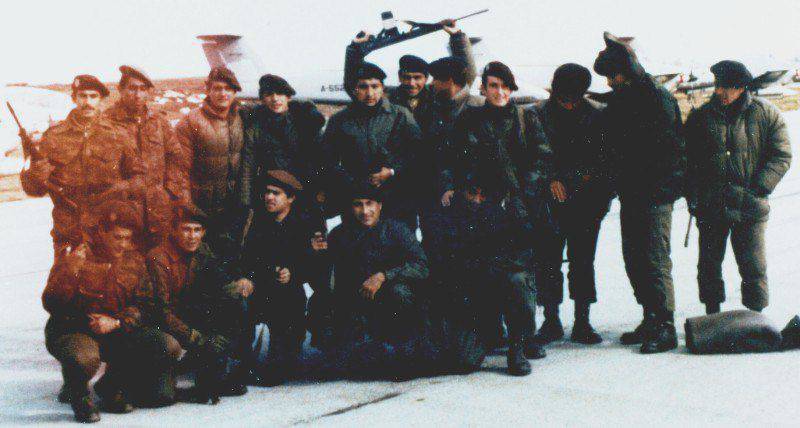
The Argentine government officially announced the accession of the Falkland Islands, renamed Malvinas, to Argentina. 7 April 1982 was held the inauguration ceremony for the governor of the Malvinas Islands, whom Galltieri appointed General Menendos. The capital of the Stanley Islands was renamed Puerto Argentino. As for the British governor Hunt and several dozen British marines who served in the Stanley garrison, they were evacuated to Uruguay. In general, the Argentinean command, not wanting a serious war with Britain, initially sought to do without human casualties among the military personnel of the enemy. The Argentinean commandos were tasked with simply “squeezing” British marines from the islands, without possibly using weapon to kill. And indeed, the seizure of the islands occurred virtually without casualties - the only dead was an Argentine officer who commanded one of the units of the marines.
More significant casualties were followed during the operation to seize the island of South Georgia. On April 3, an Argentine frigate "Gerrico" approached the island with 60 soldiers and officers of the 1 th battalion of the Marine Corps of Argentina on board. Also participated in the operation of the Argentine helicopter. A detachment of British marines 23 was stationed on South Georgia Island. Noticing the approach of the Argentine frigate, they set up an ambush and when a helicopter with a second group of paratroopers appeared over the island, the British marines hit it with a grenade launcher. The helicopter burned down, and two Argentines in it were injured. Then the island was fired from the frigate "Gerrico", after which the British garrison of South Georgia surrendered. The losses of the British side during the battle for the island amounted to one lightly wounded Marine, from the Argentine side three or four soldiers were killed and seven were injured.
The reaction of London to the events was quite expected. Britain could not allow the transfer of the islands under the power of Argentina, and even this way, casting a shadow on the reputation of a great maritime power. As usual, the need to maintain control of the Falkland Islands, was declared by the British government conditional on the safety of British citizens living in the archipelago. British Prime Minister Margaret Thatcher said: “If the islands are captured, then I knew exactly what needs to be done - they need to be returned. After all, there, on the islands, our people. Their loyalty and devotion to the queen and the country have never been questioned. And as often happens in politics, the question was not what to do, but how to do it. ”
Anglo-Argentine war on the sea and in the air
Immediately after the landing of Argentine troops on the Falklands 2 on April 1982, the United Kingdom broke off diplomatic relations with Argentina. Argentine deposits in UK banks were frozen. Argentina’s response was a ban on payments to British banks. Britain sent to the shores of Argentina, the Navy. 5 April 1982 from the British Portsmouth left the squadron of the operational group of the Royal Navy as part of 2 aircraft carriers, 7 destroyers, 7 landing ships, 3 nuclear submarines, 2 frigates. The squadron carried out air support from the 40 vertical fighter-bomber Harrier and 35 helicopters. The squadron was supposed to deliver an eight-thousand contingent of British troops to the Falklands.
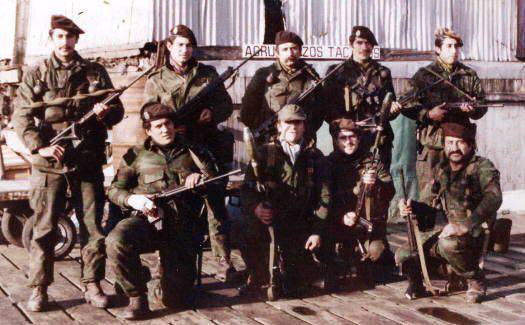 In response, Argentina began to mobilize reservists to the country's armed forces, and the airport in Puerto Argentino began to prepare for the maintenance of the planes of the Argentine air forces. Responded to what is happening and the UN Security Council. Already on 3 on April 1982, a resolution was adopted calling for a solution to the conflict situation through peaceful negotiations. Most members of the UN Security Council supported the requirement to withdraw units of the Argentine armed forces from the territory of the Falkland Islands.
In response, Argentina began to mobilize reservists to the country's armed forces, and the airport in Puerto Argentino began to prepare for the maintenance of the planes of the Argentine air forces. Responded to what is happening and the UN Security Council. Already on 3 on April 1982, a resolution was adopted calling for a solution to the conflict situation through peaceful negotiations. Most members of the UN Security Council supported the requirement to withdraw units of the Argentine armed forces from the territory of the Falkland Islands. Soviet Union abstained. The only country represented in the UN Security Council and voting against the resolution was Panama. The Soviet Union took a passive stance on the Anglo-Argentine conflict. Although the United States and Great Britain were afraid that the USSR would begin arms supplies to Argentina, using the current situation to weaken the position of the Anglo-American coalition in international politics, this did not happen. The Soviet Union waged a heavy and bloody war in Afghanistan and it simply did not reach the South American coast. In addition, ideologically, the Argentine regime of General Hasteri was alien to Soviet power and, accordingly, besides the desire to harm Britain and the United States and weaken the British naval presence in the Atlantic Ocean, the USSR did not have any other reasons to support Argentina. In the event of a possible indirect involvement of the Soviet Union on the side of Argentina, the United States and Great Britain developed a plan to weaken the Soviet position — for example, South Korea was to launch provocations against the DPRK, and Israel against Palestinian resistance. Naturally, it was assumed and the activation of the Mujahideen, fighting against the Soviet army in Afghanistan. However, it was not necessary to take anti-Soviet measures from the American and British leaders - the Soviet Union and so extremely distanced itself from the Falkland conflict.
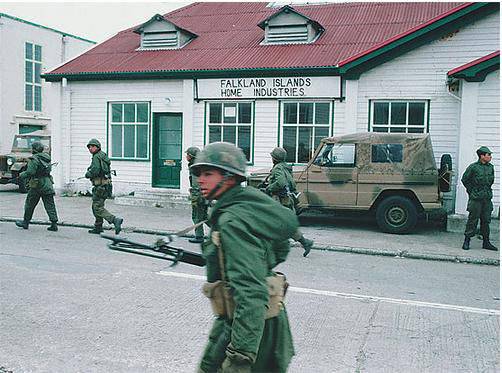
Armed confrontation between Britain and Argentina has become inevitable since the landing of the Argentine marines on the Falkland Islands. 7 April 1982 of the United Kingdom announced the blockade of the Falkland Islands from April 12 and established the 200-mile zone around the islands. A ban was imposed on the stay in the blockade zone of all military and commercial ships and vessels of Argentina. To implement the blockade, the submarines of the British Navy were involved, whose commanders were tasked with sinking any Argentine vessels attempting to enter the 200-mile zone. The ban imposed significantly complicated the interaction of the Argentine garrison in the Falklands with the military command on the mainland. On the other hand, the airfield at Stanley, now Puerto Argentino, was not suitable for servicing jet combat aircraft. The Argentine Air Force had to act from the territory of the mainland, which also complicated their use. But on the islands has focused a large group of Argentine Army and Marine Corps, there were more than 12 thousand soldiers and includes in its membership 4 infantry regiment (4-th, 5-th, 7-rd and 12-th) of the Argentine army, 1-th a regiment of marines, special purpose company 601 and 602, engineering and auxiliary units.
Although Ronald Reagan was well received in the United States by President General Galtieri, after the beginning of the Anglo-Argentine conflict, the States, as one would expect, took the side of Great Britain. However, the Pentagon doubted the success of the military operation to return the Falkland Islands and advised its British colleagues to focus on the diplomatic ways of returning the disputed territory. Many prominent British politicians and generals expressed doubts about the effectiveness of a military solution to the dispute. The colossal distance between Britain and Falkland led many warlords to doubt the ability of the full supply of British troops and sending such a contingent that could cope with the army of a large country of Argentina, located in close proximity to the Falkland Islands.
However, after the command of the British Navy convinced Prime Minister Thatcher that the fleet was able to solve the problem of returning the Falklands, Britain quickly found allies. Chilean dictator General Augusto Pinochet allowed the use of Chilean territory for British commandos against Argentina. For using British aviation an American military base on Ascension Island was provided. In addition, British aircraft took off from aircraft carriers of the British Navy. Naval aviation was tasked with providing air support to the Marine Corps units and ground forces, which were supposed to land on the Falkland Islands and conduct ground operations to free them from the Argentine occupation. On April 25, the first units of the British troops landed on the island of South Georgia, which is located at a considerable distance from the Falkland Islands. The Argentine garrison located on the island, inferior to the landed British units in numbers, training and weapons, capitulated. Thus began the operation to return the Falkland Islands to the British Crown.
1 May 1982 British naval aviation and fleet fired on objects of Argentine troops at Port Stanley. The next day, the British nuclear submarine attacked and sank the cruiser of the Argentine Navy, General Belgrano. As a result of the attack, the Argentinean Navy 323 died. Such large losses forced the Argentine naval command to abandon the idea of using the fleet, many times inferior to the British, and return the ships of the Argentine Navy to the bases. After 2 in May, the Argentine Navy no longer participated in the Falkland War, and the command of the armed forces decided to rely on aviation, which the British ships were to attack from the air.
The Argentine Air Force, at the time of the events described, was deploying 200 combat aircraft, of which around 150 took direct part in the hostilities. The Argentinean generals expected that the aerial bombardment of British ships would entail great loss of life and London would order the ships back. But here the command of the Argentine armed forces overestimated the capabilities of their aircraft. The Argentine Air Force lacked modern weapons. Thus, the French-made Exochet anti-ship missiles, which were equipped with Super Etandar attack aircraft, the Argentine Air Force had only five. However, they also brought significant benefits to the Argentine troops, since one of these missiles damaged the new British destroyer Sheffield, which sank. As for air bombs, Argentina was also far behind here - more than half of the US-made bombs were released as early as the 1950s and were not suitable for use. Getting into the British ships, they were not torn. But the Argentine Air Forces, among other types of armed forces involved in the Falkland War, showed themselves to the top. It was the skill of the pilots of the Argentine Air Force for a long time allowed the country to keep a decent defense of the Falkland Islands, causing significant damage to the British fleet. Considering that the Argentine fleet proved to be practically inefficient, and the ground forces had a low level of training and also could not seriously resist British forces, aviation throughout the initial period of the war remained the main striking force of Argentina in the battle for Falkland.
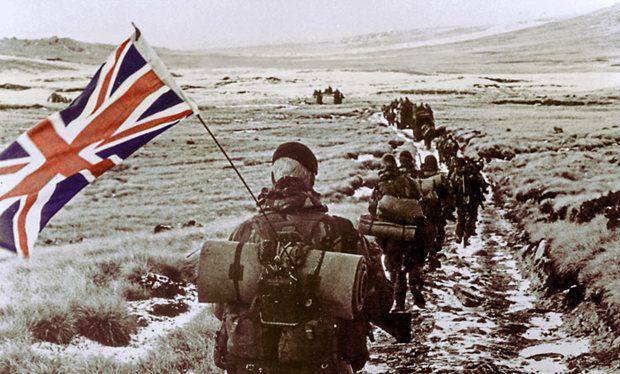
Land operation and the return of Falklands
On the night of 15 in May of 1982, British special forces from the legendary SAS destroyed eleven Argentine planes at a military airfield on Pebble Island. Preparations for the landing on the Falkland start 3-I brigade of the Royal Marines of Great Britain. May 21 embarked on the landing of a brigade unit in San Carlos Bay on the night of May. The resistance of the nearby Argentine unit was quickly crushed. However, Argentine aviation attacked British ships at the bay. 25 in May, the plane, which was piloted by the captain of the Argentine aviation, Roberto Kurilovich, managed to sink the Exoset missile by the British container ship Atlantic Conveyor, which was carrying CH-47 helicopters. The ship sank after a few days. However, this small victory could not prevent the beginning of the ground operation of the British troops. May 28 battalion parachute regiment managed to defeat the Argentine garrison in Darwin and Goose Green, capturing these settlements. Subunits of the 3 Brigade of the Marine Corps made a foot march to Port Stanley, in the area of which the landing of the 5 B Infantry Brigade of the British Ground Forces also began. However, 8 June Argentine aviation managed to win a new victory - two amphibious ships, unloading military equipment and British soldiers, were attacked from the air in Bluff Cove, resulting in the death of British military 50. But the position of the Argentine army in the Falklands became critical. The 3-I brigade of marines and the 5-I infantry brigade of Great Britain surrounded the area of Stanley, blocking Argentine troops there.
On the night of June 12, a British Marine Corps 3 Brigade attacked Argentine positions around Port Stanley. By morning, the British managed to reach the heights of Mount Harriet, Two Sisters and Mount Longdon. On the night of June 14, units of the 5 Infantry Brigade stormed the heights of Mount Tumbledown, Mount William and Wireless Ridge. The 5 Infantry Brigade operated a battalion of famous Nepalese riflemen - Gurkha, who did not even have to fight. Argentine soldiers, seeing Gurkha, preferred to surrender. Associated with this episode is a famous example of Gurkha’s military prowess. The Gurkhas who broke into Argentinean positions got out their Khukri kings, intending to enter hand-to-hand fighting with the Argentines, but since the latter prudently chose to surrender, the Gurkhas had to scratch themselves - according to Nepalese khukri traditions, which had gotten out of the way, they had to be chased; the enemy. But the Gurkhas could not come to mind to lay down the arms of the Argentines.
On the same day, 14 Jun Port Stanley was commissioned by the Argentinean command. The Falklands War ended with the defeat of Argentina, although the date of its end is considered to be 20 of June - the day the British troops landed on the South Sandwich Islands. 11 July 1982 announced the end of the war the leadership of Argentina, and 13 July its end recognized the United Kingdom. To ensure the protection of the islands, five thousand soldiers and officers of the British armed forces remained on them.
According to official data, the victims of the Falkland War from the British side were 256 people, including 87 sailors, 122 ground troops, 26 marines, 1 Air Force soldiers, 16 sailors merchant and auxiliary fleet. The casualties of the Argentine side were 746 people, including 393 military sailors, 261 military ground troops, 55 air force soldiers, 37 marines. As for the wounded, their number in the ranks of the British army and navy was 777 people, from the Argentine side - 1100 people. 13 351 soldier of the Argentine army and navy at the end of the war were captured. Most of the prisoners of war were released, but for some time about six hundred Argentine prisoners of war remained on the Falklands. The British command held them to put pressure on the Argentine leadership on the issue of concluding a peace agreement.
As for the losses in military technology, they were also significant. The Argentine Navy and the merchant fleet lost the 1 cruiser, the 1 submarine, the 1 patrol boat, the 4 transport vessel and fishing trawler. As for the British Navy, the losses here were more serious. Britain was left without 2 frigates, 2 destroyers, 1 container ship, 1 landing craft and 1 landing craft. This correlation is explained by the fact that after the sinking of the cruiser, the Argentinean Command prudently diverted their navy to bases and no longer used it in the conflict. But large-scale losses Argentina suffered in aviation. The British managed to shoot down or destroy more than 100 airplanes and helicopters of the Argentine Air Force on the ground, with the 45 aircraft destroyed by anti-aircraft missiles, the 31 aircraft in aerial combat and the 30 aircraft on airfields. The losses of British aviation were many times smaller - the UK lost only ten aircraft.
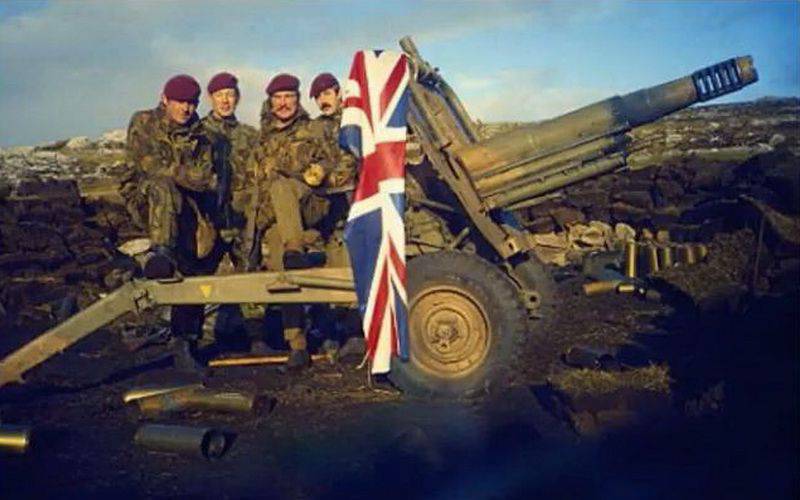
The outcome of the war for Britain was the rise of patriotic sentiments in the country and the strengthening of Thatcher’s cabinet positions. October 12 1982 in London even had a Victory Parade. As for Argentina, the defeat in the war caused a negative public reaction. In the capital, mass protests began against the government of the military junta, General Galtieri. 17 June, General Leopoldo Galtieri resigned. He was replaced by another military leader, General Reinaldo Bignone. However, the defeat in the war did not mean Argentina’s refusal of claims to the Falkland Islands. Up until now, a significant part of the population of Argentina, and many politicians are in favor of joining the islands, considering their territory colonized by the British. However, consular relations between Argentina and Great Britain were restored in 1989, and diplomatic relations were restored in 1990.
The economy of the Falkland Islands has historically been based on seals and whales, then sheep breeding has spread to the islands, which today, along with fishing and the fish processing industry, provides the main income for the Falklands. Most of the islands are occupied by pastures used for sheep breeding. Currently, only the 2 840 people live in the Falkland Islands. Mostly they are descendants of English, Scottish, Norwegian and Chilean immigrants. 12 island dwellers are immigrants from Russia. The main language spoken in the Falklands is English, only 12 speaks Spanish. Mostly Chilean immigrants. The British authorities prohibit the use of the name Malvinas for designating islands, seeing in this evidence of the territorial claims of Argentina, while Argentines see the name Falklands as an additional confirmation of the colonialist aspirations of Great Britain.
It should be noted that in recent years, exploration of possible oil fields has been started in the Falkland Islands. Preliminary estimates call the numbers of oil reserves in 60 billion barrels. If indeed the Falklands possess such significant oil resources, they are potentially one of the largest oil regions in the world. In this case, of course, Great Britain will never give up its jurisdiction over the Falklands. On the other hand, the English-speaking population of the Falkland Islands in the bulk is not going to give up British citizenship and become a citizen of Argentina. Thus, 99,8% voted in a referendum on the political status of the islands, held in 2013, were in favor of maintaining the status of overseas territory of Great Britain. Of course, the results of the referendum were not recognized by Argentina, which indicates the preservation of the “open” nature of the dispute over the Falkland / Malvinas Islands.
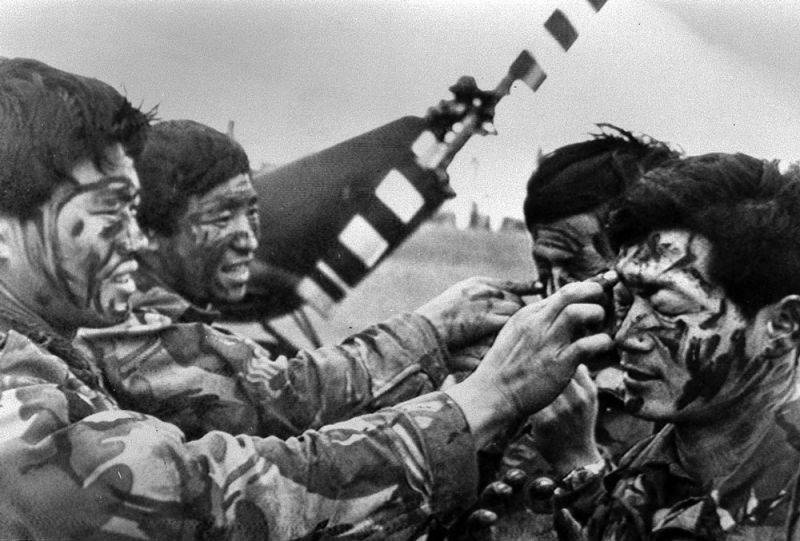
Information